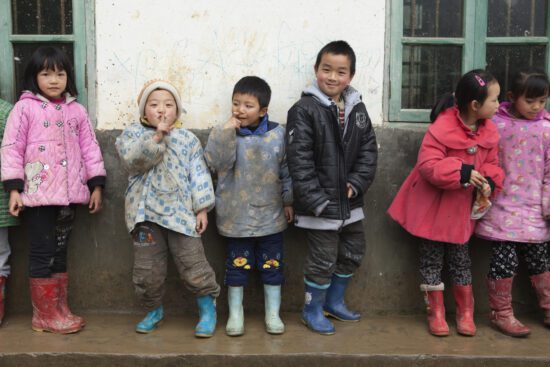For much of our life, we have heard the cliché, “Christianity is a relationship, not a religion." Such a statement would make little sense to James the brother of Jesus. In James 1:27, our Lord’s younger brother commended a thoroughly religious life. He wrote, “Religion that is pure and undefiled before God is this: to visit orphans and widows in their affliction, and to keep oneself unstained from the world.” Surely James is a faithful guide in our pursuit of Christ. The essence of Christianity must not be reduced to a matter of our personal relationship with Jesus. Jesus made this clear when he stated, “All people will know that you are my disciples, if you love one another” (John 13:35).
Love for others is one of the major points in the book of James, which teaches us that a saving faith is a serving faith. Such service is expected of us when it comes to caring for the weak, oppressed, and marginalized in this world. And, as we will see, when we serve the least of these, we are reflecting the heart of God.
What God says about orphans
Throughout the Old Testament, God unequivocally condemned the mistreatment and neglect of the fatherless. The fatherless were without protection or inheritance, which left them susceptible to exploitation. God revealed himself to the Israelites at the God who “executes justice for the fatherless” (Deut. 10:18; Ps. 10:14, 18), who provides food (Deut. 24:19-21, 26:12-13), who acts as a Father (Ps. 68:5), who instructs the covenant people of their obligation to care for the orphan (Isa. 1:17; Jer. 7:6, 22:3; Zech. 7:10), and in whom “the orphan finds mercy” (Hos. 14:3).
A saving faith is a serving faith.
In the New Testament, Jesus paralleled his return to that of a father who does not leave his disciples “as orphans” (John 14:18). God cares for the orphan and the vulnerable. His eye watches over their plight. And he ordains that his people should care for the orphan. Thus, it is impossible to imagine that a person could be considered “godly” without regard for the orphan.
What orphan care entails
What, then, does orphan care entail? In the past, some have assumed that the only way to care for the orphan is through adoption. To be sure, this is certainly the greatest way that God cares for us in our state as spiritual orphans. Believers have “received the Spirit of adoption as sons, by whom we cry, ‘Abba! Father!’” (Rom. 8:15). God the Father “predestined us for adoption to himself as sons through Jesus Christ, according to the purpose of his will” (Eph. 1:5). We must not make light of the importance of adoption in orphan care.
However, we must also make sure that we do not narrowly define “orphan care” to mean “adoption.” When the Old Testament speaks of caring for the fatherless in the community, it does not necessarily command adoption. God intended for some of the fatherless to remain among their family members while being supported by members of the covenant community. As the book of Job describes, the righteous were not to take advantage of the vulnerable child or the widow’s plight. They were not to “drive away the donkey of the fatherless” or “take the widow’s ox for a pledge” (Job 24:3). Adoption was not the only option for orphan care in the Old Testament, and it is not the only option in our day.
At times, caring for the orphan will mean adoption. At other times, it will mean providing support for the widow who cannot care for her child and faces the threat of having to give him up for adoption. It was often the case in the Old Testament that a woman’s husband would die and leave her with little legal recourse, and even less financial resources for survival. When a child was added to the equation, the strain became even greater. God expected the Israelites to support the widow and her child (the fatherless) in such a vulnerable state. The terrible situation of the widow and the fatherless did not reduce their dignity in God’s eyes. He intended to “give justice to the weak and the fatherless” while maintaining “the right of the afflicted and the destitute” (Ps. 68:5).
In some modern-day situations, it is possible for a child to remain with their mother or immediate family if they receive a little financial support. In other words, some orphan care should be preventive and proactive. This, of course, is not to dissuade those who feel called to care for orphans through adoption. May it never be! However, not everyone has the resolve or resources for an adoption, and children need to be able to stay with their families wherever possible. We need categories of orphan care that allow all Christians participate in the work.
What orphan care is about
What, then, is orphan care about? Orphan care is about upholding justice for and showing mercy to children who have no family or are threatened with the possibility of losing their family. It is not about the utility or void that the child can fill in your life. Orphan care is not primarily about the satisfaction of your desires for your family. It is about advocating for and supporting the life of those who lack the resources to do so for themselves.
Orphan care is not glamourous. It is not a hashtag. It is not about satisfying a “savior complex.” Orphan care is difficult. It is spiritual. It is warfare. It requires physical, emotional, financial, and social sacrifice. There will be tears. There will be doubts. There will be unanswerable questions. Some days will be a breeze, while others will be a hurricane. Yet, the work is worth it because God has called us to it, and he is worthy!
As believers participate in orphan care, they will realize that the whole process provokes deep introspection. It is hard for a believer to look into the eyes of an orphan or vulnerable child and not see aspects of their former life apart from Christ. We were once vulnerable, exploited, and afraid. We also had attachment issues, fleeing the grace of a loving Father because all we had ever known was brokenness and pain. We too have felt like outsiders, longing for a sense of our name and heritage from a former way of life.
The task of orphan care will feel impossible. Such feelings are intended to drive us to the sufficiency of Christ. In and of ourselves, we are not equipped to care for some of the most vulnerable among us, but in Christ, we are granted the emotional and spiritual resources to practice the pure and undefiled religion that the Father of the fatherless loves to see in his adopted children.











